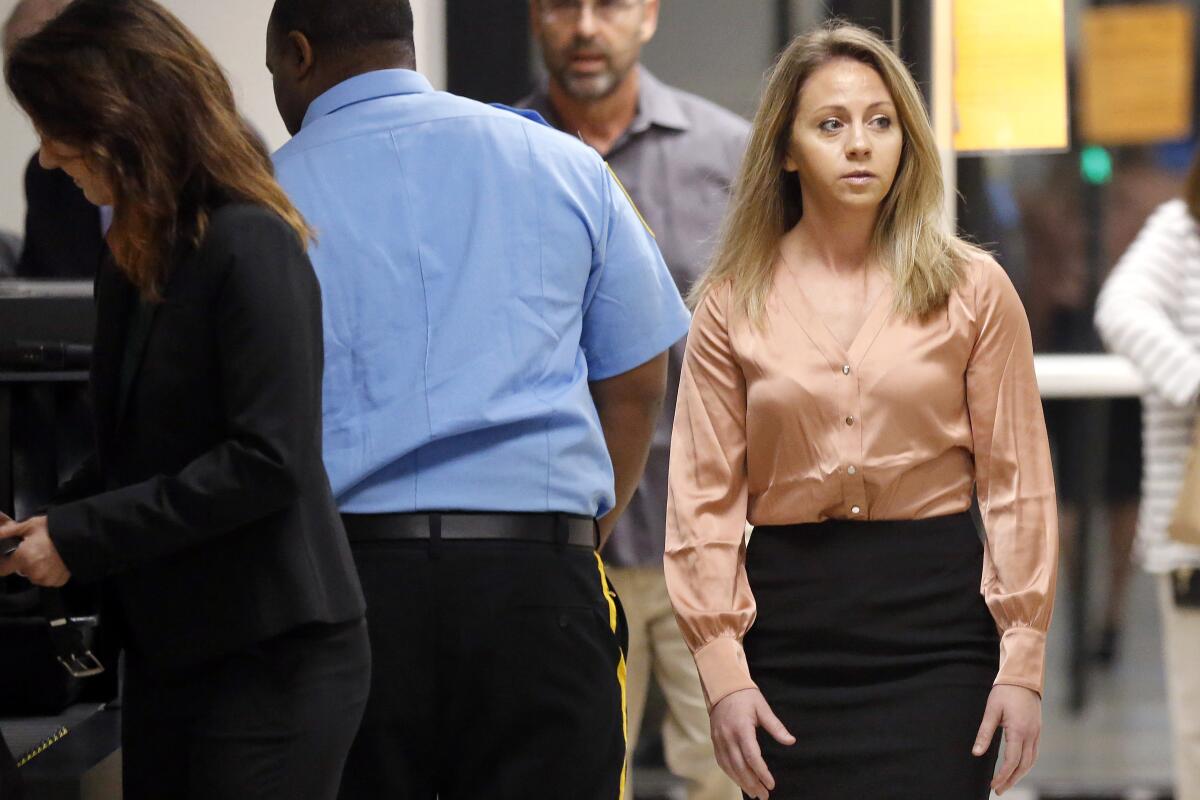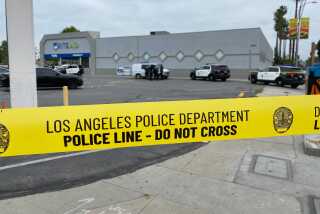Editorial: Finally, a deadly police shooting is found to be beyond the pale

At least we now know that an off-duty police officer can’t walk into someone else’s apartment, shoot him dead and then successfully claim self-defense because she mistakenly thought she was killing an intruder in her own home.
Instead, a Dallas jury on Tuesday convicted Amber R. Guyger of murder, and then on Wednesday sentenced her to 10 years in prison. The white officer killed her 26-year-old African American neighbor, Botham Shem Jean, last year.
The verdict is in some sense a relief, because had it gone the other way it would be hard to say just how poor an officer’s judgment has to be before she can be held fully accountable for such an outrageous misuse of deadly force. Police officers do make fatal mistakes, but we hire, train and deploy them to protect us, not to rule over us, and some mistakes are so egregious as to be criminal. Surely killing an innocent man in his own home is one of them.
Reciting the circumstances of even just a few high-profile police shootings of African American boys and men over the last several years is like descending a staircase of fear and oppression, with each step pockmarked by excuses.
Ferguson, Mo., police Officer Darren Wilson was not charged in the 2014 killing of Michael Brown because there was insufficient evidence to refute the officer’s contention that he was in fear for his safety.
The person who called the Cleveland Police Department about the young boy waving a gun in 2014 warned the cops that it was probably fake, but they arrived at the scene and, seconds later, shot 14-year-old Tamir Rice to death. Officers Timothy Loehmann and Frank Garmback were not charged.
Philando Castile notified the officer who pulled him over in 2016 in St. Anthony, Minn., that he had a gun in the car, which is exactly what a driver is supposed to say in those circumstances, for his own safety and the officer’s. But Officer Jeronimo Yanez shot Castile to death anyway. He was charged with manslaughter but acquitted.
There has to be a floor for police deadly misconduct, does there not? Even if the misconduct is abysmal judgment. Entering into someone’s home and killing them is quite a low floor.
Now let’s work on raising that floor in order to demand better conduct from police. That was the point of two bills recently signed into law in California in response to the deadly shooting last year of Stephon Clark in Sacramento. Clark was unarmed.
Assembly Bill 392 raises the standard for police deadly force, permitting officers to shoot only when necessary to prevent death or serious bodily injury to innocent third parties or themselves. Senate Bill 230 requires departments to offer better training to curb unnecessary shootings. These new laws impose some of the highest standards in the nation for police conduct.
But their reach is limited to this state. Elsewhere, as in Texas, the case has to get to the jury.
Even here, police shootings are often not even charged. Consider Los Angeles police Officer Salvador Sanchez, who was off-duty June 14 when he shot to death unarmed Kenneth French in the Corona Costco and wounded French’s parents.
A Riverside County grand jury decided last week not to charge Sanchez, even though French was unarmed, and even though Sanchez shot him in the back. Corona police later said Sanchez opened fire when French was an estimated 20 feet away.
The French killing is a reminder that troubling cases of police force do not always involve white cops and black victims. In an era of declining crime, the United States continues to grapple with the challenge of deadly police force, often but not always exacerbated by race.
The line that separates acceptable and unacceptable police conduct is set by the police themselves, and what conduct a typical officer in the same circumstances would consider reasonable. That line slowly moves forward over time, as training improves, as juries in civil cases award damages in wrongful death cases and as juries in criminal cases find officers guilty.
The French killing doesn’t move the line, and won’t, unless the officer faces consequences from his LAPD employer. The Jean killing doesn’t move the line forward either. But at least it won’t move it in the other direction.
More to Read
Updates
4:05 p.m. Oct. 2, 2019: This editorial was updated with details of Amber Guyger’s sentencing.
A cure for the common opinion
Get thought-provoking perspectives with our weekly newsletter.
You may occasionally receive promotional content from the Los Angeles Times.










